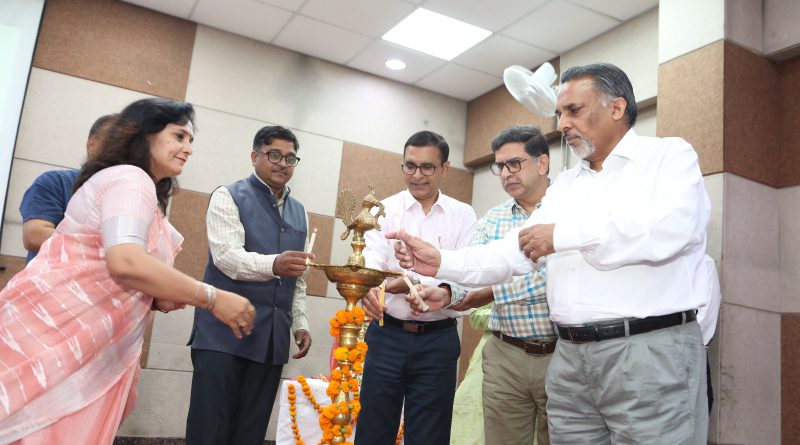VAC Committee of DU in collaboration with Rajdhani College organizes Workshop on Ecology and Literature
New Delhi (KCN) :
Academic explorations in the field of literature pave a fruitful path for creating a harmonious habitat within our ecological system. Flawless synchronisation of “intelligence, innovation, and tradition” results in the development of a conscious self, averred Prof Balram Pani, Dean of Colleges, University of Delhi, as he emphasized on integration of ecology, science, and literature in contemporary times. Prof. Pani’s lines essentialised the significance of Ecology and Literature which is one of the Value Addition Courses (VAC) that has been introduced under the New Education Policy (NEP) 2020 scheme.
Value Addition Courses Committee, University of Delhi, in collaboration with Rajdhani College organized a Workshop on Ecology and Literature in the auditorium of the college. The occasion was graced by Chief Guest Prof. Balram Pani, Guest of Honour Ravi Shankar, Director, Centre for Civilisational Studies, Delhi and Editor, Gangananchal, Chair Prof Niranjan Kumar, Chairman, VAC Committee and Dean, Planning, DU, Ashutosh Bhardwaj, Chairman, Governing Body of Rajdhani College and the Principal of the college Prof. Rajesh Giri.
During the Inaugural Session, Course Coordinator of VAC Committee Prof Varsha Gupta in her opening remarks emphasized on the essence of our culture being ethics and moral values in which holistic development of individuals is attained from immersing oneself within the realm of one’s inner being. Emphasis was laid on the celebration of wonders of nature in works various important figures like Mahatma Gandhi, William Wordsworth, and Rabindra Nath Tagore while examining the environmental challenges with deeper understanding of the delicate balance between human beings and the natural world.
Resonating the relevance of nature in establishing and aligning oneself while catering to the wider ambience of social existence, Prof Balram Pani drew attention to the many ‘avatars’ in the ancient Indian epistemological tradition and philosophies. He also mentioned the interplay of literature, nature vis-à-vis scientific temper for students to develop a profound appreciation for our ecosystem and emerge as advocates for its preservation.
In order to attain such prime harmony within the ecosystem, optimum investigations have been introduced in the coursework under the Vidya Vistar Scheme. Prof Rajesh Giri stressed on the significance of the empowerment of teachers to make the holistic, integrated, and experiential learning approach in order to build a congenial atmosphere for a better understanding of ecology and environment. He also delved into to Kalidas’s Meghadootam, and Ghag ki Kahawatein to bring out the intricate weaving of ecology in Indian texts.
Furthermore, Prof Ashutosh Bharadwaj discussed the profound connection between the complex study of organisms in our ecosystem with the rich tapestry of literature that aims to explore the interdisciplinary connections while stressing on the aim of the workshop which is to add value to the collaborative teaching learning environment. Following which, Prof Niranjan Kumar seeked to establish a connection between the study of individual and the world by relating it to the Indian knowledge system. He differentiated between the Indian and western philosophy, while celebrating the Indian scripture’s ability to involve the significance and interaction of man with nature, in contrast with their western counterparts’. He focused on the VAC courses in facilitating an environment that caters to experiential learning to promote innovation and holistic development among all stake holders in the field of education.
In continuation to the emphasis laid on the Ancient Indian scripture in depicting perfect…

